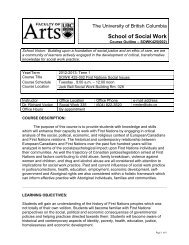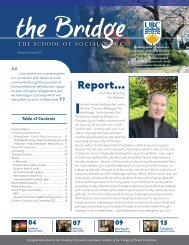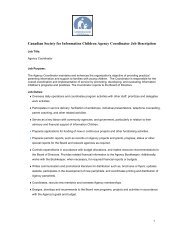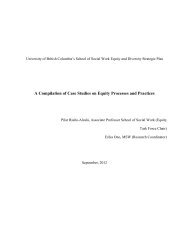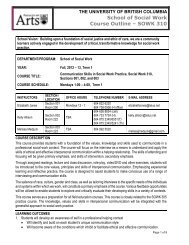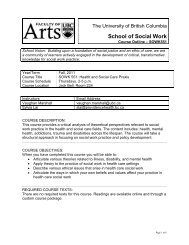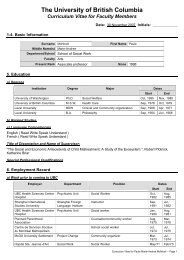SOWK 335.001. Social Analysis for Social Work Practice. - School of ...
SOWK 335.001. Social Analysis for Social Work Practice. - School of ...
SOWK 335.001. Social Analysis for Social Work Practice. - School of ...
You also want an ePaper? Increase the reach of your titles
YUMPU automatically turns print PDFs into web optimized ePapers that Google loves.
<strong>SOWK</strong>335(001) – 2012-2013<br />
• Students who use electronic devices to aid in their learning process (e.g. laptop<br />
computers) must have the permission <strong>of</strong> the instructor to use the device and, if<br />
permission is granted, must have the wireless capacity <strong>of</strong> the device turned <strong>of</strong>f.<br />
• All cell phones must be turned <strong>of</strong>f.<br />
COURSE SCHEDULE, Term 1<br />
Week 1: Sept 6, Introduction Pr<strong>of</strong>essor Brian O’Neill<br />
Thompson (2012): Introduction<br />
Ch. 1: Equality,diversity and social justice<br />
Week 2: Sept 13, Theoretical frameworks<br />
Thompson (2012): Ch. 2: The theory base<br />
Ch. 4: Ethnicity and racism<br />
Week 3: Sept 20, Debates<br />
Campbell, C. (2003). Anti-oppressive theory and practice as the organizing theme <strong>for</strong><br />
social work education: The case in favour. Canadian <strong>Social</strong> <strong>Work</strong> Review, 20(1), 121-<br />
125.<br />
Tester, F. J. (2003). Anti-oppressive theory and practice as the organizing theme <strong>for</strong><br />
social work education: The case against. Canadian <strong>Social</strong> <strong>Work</strong> Review, 20(1), 127-<br />
132.<br />
Campbell, C. (2003). Rebuttal: <strong>Work</strong>ing within contradiction and ambiguity. Canadian<br />
<strong>Social</strong> <strong>Work</strong> Review, 20(1), 133-135.<br />
Tester, F. J. (2003). Rebuttal: Difference, dissent, and common ground. Canadian<br />
<strong>Social</strong> <strong>Work</strong> Review, 20(1), 137-138.<br />
Prior, J. (2004). Anti-oppressive practice: Why bother?In H. G. Eriksson & T. Tjelflaat<br />
(Eds.), Residential care: Horizons <strong>for</strong> the new century (pp. 3-22). Aldershot, Hants,<br />
England: Ashgate Publishing.<br />
Week 4: Sept 27, Reflexive <strong>Practice</strong><br />
D’Cruz, H., Gillingham, P. and Melendez, S. (2007) ‘Reflexivity, its meanings and<br />
relevance <strong>for</strong> social work: A critical review <strong>of</strong> the literature’, British Journal <strong>of</strong><br />
<strong>Social</strong> <strong>Work</strong>, 37(1), pp. 73–90.<br />
Butler, A., Ford, D. and Tregaskis, C. 2007. Who Do We Think We Are? Self and<br />
Reflexivity in <strong>Social</strong> <strong>Work</strong> <strong>Practice</strong>. Qualitative <strong>Social</strong> <strong>Work</strong>; 6; 281<br />
Page 4 <strong>of</strong> 15



